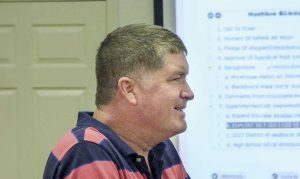Perhaps it’s the Scotch-Irish mountain streak in me but I love adding “ed” to words.
It doesn’t bother me to say “knowed,” “borned,” “growed,” “blowed,” “drowned,” “tored,” when I’m amongst my people. And when someone else from the mountains says, “see’ed,” “sawed” or “tolded,” my senses are not offended in the least. It sounds like a language that belongs solely to us. In the centuries past, someone “tolded” us that if it had already happened, you should add “ed” on the end to make it past.
We listened well. And, like most of my mountain kin, I don’t forget easily.
This all came to mind when Tink and I recently had a debate over a word. I believe I’ve told you this before but it bears repeating: My husband is a wordsmith. He writes correctly. He speaks correctly and he pronounces big, long, difficult words easily.
I can’t. I’ve noticed I’m not alone. There is something about the ear – the hearing – of mountain folks that keeps us from being able to pronounce certain sounds. We hear it one way while city folks – and Yankees – pronounce it another. It isn’t that we’re dumb. It’s just something that was “borned” in us and it has marked us for generations.
The first time that Tink heard me pronounce “jalapeno”, he fell over laughing. “What did you say?” He asked. Any time he asks this, I know I’ve misspoken.
“Hala-peen-no.” I repeated.
“It’s Hala-peen-yo,” he corrected.
Now, how was I supposed to know that? There was no one speaking Spanish in the Appalachians. I was taught to say words phonetically. I see a word and I say it out loud just as I was taught in first grade. I was never given rules such as when Tink says, “The ‘l’ is silent in that word.”
How do I know the ‘l’ is silent? It was talking to me when I phonetically sounded out the word.
This all came about the other day because I had written a column about a graveled road. Tink read my draft and said, “This is beautiful. And beautifully written. But it’s ‘gravel’ not graveled.’”
Come to think about it, Tink’s kinda like Mama. Sometimes he gives me a compliment then cancels it out. It doesn’t bother or offend me, though. On a scale of spoken English, Tink is a huge 10. I’m much lower. I won’t rank myself because it could possibly harm my self-confidence. Tink can pronounce a medical word that is 30 letters long and say it perfectly. This is not because he is a doctor but rather because he used to write one on TV. And won an Emmy for it.
When Tink said, “It’s gravel, not graveled”, I didn’t argue. I changed the word. But then I got to thinking, “Wait a minute – Mama and Daddy always said ‘graveled’. Everybody I know says ‘graveled.’”
Then this occurred to me: If enough people say it, it has to become a word.
“I think you’re wrong about gravel versus graveled,” I said.
“I looked it up to be sure.”
“Yes, but if a road has been laid with gravel, it has been graveled.” I dug my heels into the gravel and stayed there. I changed it back to “graveled” in my column.
Then I posed the question on social media and folks went nuts. The Yankees all said “gravel,” the rural Southerners said “graveled” and a few said that they were never well-off enough to have gravel so it was always a dirt road.
Tink was a good sport. He always is. He never wants anyone to think that he doesn’t love the South or our particular way of talking. He’s even come around to saying “knowed” a good bit.
And if it comes down to it, he’ll even admit that he was wronged. Although his people would say, “incorrect.”
[Ronda Rich is the best-selling author of “Mark My Words – A Memoir of Mama.” Visit www.rondarich.com to sign up for her free weekly newsletter.]









Leave a Comment
You must be logged in to post a comment.